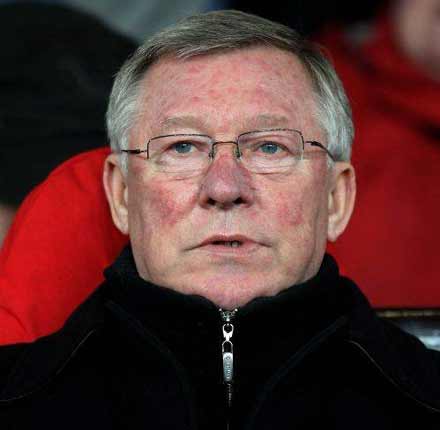FA accuses Ferguson of lack of respect for game
Commission says United manager was banned for criticising referee's integrity and then failing to apologise

The fractious relationship between Sir Alex Ferguson and the Football Association came under further strain last night after publication of a disciplinary report which revealed that the Manchester United manager's disrespect for "the integrity of the game" and refusal to apologise had brought his five-match touchline ban.
The report of the FA Regulatory Commission, convened to rule on Ferguson's attack on match official Martin Atkinson after United's 2-1 defeat at Chelsea earlier this month and his claim that United did not get a "fair" referee, revealed that it took a dim view of Ferguson's attempt to argue that he did not use the word "fair". The commission said Ferguson's vast experience should have told him that he was undermining referees and the FA's Respect campaign. The commission also considered this attack on refereeing integrity to be a more serious offence than Ferguson's personal comments about the fitness of referee Alan Wiley in October 2009, which left a two-match suspended touchline ban, triggered by a commission which observed he had shown scant concern that this was "hanging over him".
"Whatever view one may take about the performance of Mr Atkinson, or any other [referee], respect for their integrity is essential for the integrity of the game," wrote Craig Moore QC, the barrister who chaired the commission. "His vast experience ought to have left Sir Alex in no doubt as to how any sense of injustice he may have felt about the decisions made, or the performance of an official, should properly be expressed. Although he denied any intention to question Mr Atkinson's integrity, he should, at the very least, have realised the import of what he said."
And of his refusal to apologise: "No clarification or retraction of any of his comments has been made by Sir Alex and no apology given to Mr Atkinson, even after the charge had been brought. It follows that any credit to which Sir Alex may have been entitled by admitting the charge, and reduction in sanction, was lost." The FA's decision to publish the commission's report is not unprecedented. High-profile cases are published and the findings of the Wiley case, in which Ferguson received an initial three-match ban, were revealed. But the United manager's known sense of grievance at a verdict which he believes to have been unfair will only be intensified by the decision to publish. His feelings are known to have been fuelled by the Tottenham manager, Harry Redknapp, escaping censure after claims that referee Mark Clattenburg and his officials would collude to get their story straight after United's controversial win against Spurs at Old Trafford in December. The commission papers reveal that Ferguson's counsel, Graham Bean, cited the misdemeanours of several other managers in his client's defence – though this line or argument was also dismissed.
The commission report discloses that Ferguson attempted to argue – in the face of seemingly irrefutable TV footage – that he had not even said Atkinson was not a "fair" referee, that he had retracted the offending word immediately and had laid greater vocal emphasis on the word "strong". Ferguson's words to MUTV were: "You want a fair referee, you know... you want a strong referee anyway."
Mr Moore concluded that "any reasonable person, hearing the post-match interview given by Sir Alex, would have understood his use of the word 'fair' to imply that Mr Atkinson had been 'unfair', in the sense that he had failed to act impartially when he made, or failed to make, certain decisions during the course of the match. No alternative meaning of the word 'fair' was advanced on his behalf."
The lack of an apology or clarification from Ferguson, who is not appealing against the decision, was a "serious aggravating feature", the commission ruled. The comments "undermined attempts by the Association, through its Respect Campaign to encourage higher standards of behaviour in the game, including respect for officials."
Of the Ferguson team's decision to cite other cases, Mr Moore concluded it was "required to consider this alleged offence on its own merits". Neither did the commission accede to a request not to trigger the two-game suspended ban.
The report reveals that the temporary FA chairman, Roger Burden, and former West Bromwich defender and now FA Panel member Paul Raven were on the six-man panel, which also comprised a further FA Council member, the FA's disciplinary manager and its senior disciplinary assistant. Ferguson was represented by the former FA compliance officer Bean, with League Managers' Association chief executive Richard Bevan there as an observer.
Ferguson, who was in touch with his bench by a landline telephone during the 1-0 win over Bolton on Saturday should be back in his place for the game at Arsenal on 1 May after the Premier League rescheduled United’s away game against Newcastle United for 19 April.
The key points
What Ferguson said:
"You want a fair referee, you want a strong referee anyway. We didn't get that."
The FA's verdict:
* The commission was referred to Sir Alex's previous disciplinary record.
* He denied the present charge in the face of a strong case against him.
* Although he denied any intention to question Mr Atkinson's integrity, he should, at the very least, have realised the import of what he said.
* It follows from his denial that no clarification or retraction of any of his comments has been made by Sir Alex and no apology given. The commission regarded this as a serious aggravating feature.
* Sir Alex's comments undermined the attempts by the FA to encourage higher standards of behaviour.
Join our commenting forum
Join thought-provoking conversations, follow other Independent readers and see their replies
Comments
Bookmark popover
Removed from bookmarks